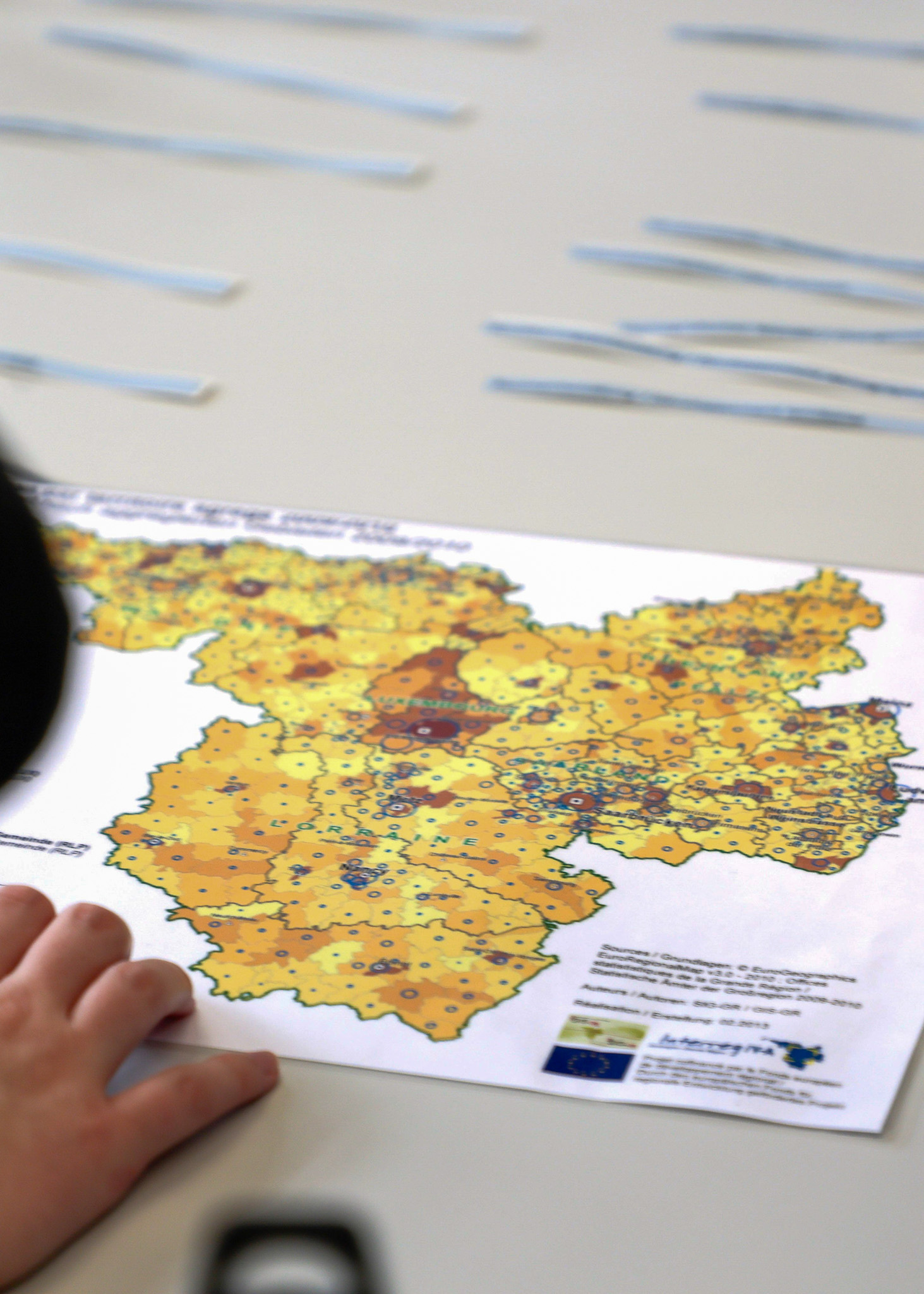Activities
Planspiele (Simulation games)
The Working Group "Spatial Planning" uses the Planspiel (simulation game) method to explore different planning cultures and to promote cross-border exchanges between planners, spatial planning students and politicians.
“A planning game is a teaching method belonging to the category of simulation games. It is a representation of real systems depicted within dynamic models. In these participants collaboratively simulate the interaction processes […] in the concerned domain. The method makes it possible to simulate situations, […] actions, events, strategies, negotiation and decision-making processes to better understand, experience and evaluate them. The method can be used in different contexts […] such as education, professional training and research.” (translated from French according to Rouchet, 2025)
The following Planspiele have already been developed and conducted:
-
February 2022 | Planspiel ECO-REGIO GREATER REGION 3.0 in the framework of an advanced training on planning cultures and cross-border spatial planning with planning practitioners, politicians and students from the Greater Region
-
Organization: Technische Universität Kaiserslautern / Université de Liège / WG Spatial Planning / UniGR-Center for Border Studies | Location: Esch-sur-Alzette, Luxembourg | Date: 10 and 11/02/2022
On February 10 and 11, 2022, the WG Spatial Planning organized a two-day online workshop on the topic of planning cultures and cross-border spatial planning in the Greater Region. The ECO-REGIO GREATER REGION planspiel was revised again for this purpose.
About 50 participants took part in the event, consisting of students, planning practitioners and politicians from the entire Greater Region (Rhineland-Palatinate, Saarland, Luxembourg, Grand-Est and Wallonia). This interactive and cross-border training included lectures and discussions as well as a business game aimed at developing a cross-border ecoregion through the revitalization of a fictitious industrial wasteland.
The simulation allowed to explore the different approaches in spatial planning within the Greater Region as well as the challenges in the cross-border context, a hitherto underdeveloped field of education and research, to which the working group "Spatial Planning" of the INTERREG project UniGR-Center for Border Studies is dedicated.
The planspiel has already been carried out several times in a similar way. A special feature this time, however, was that in addition to practitioners, politicians and students of spatial planning were also involved. Parallel to the learning process designed for the participants, the researchers collected a lot of data that will be analyzed, processed and communicated through further education, policy papers, projects and scientific publications.
Due to pandemic-related constraints, the simulation took place in online mode, unlike usual. This presented a major technical and logistical challenge. During the implementation, it was important to the organizing team to organize an interactive and communicative event despite the general conditions. The initial assessment of the event is very positive from the point of view of both the participants and the researchers. The event is a good example of how cross-border cooperation can overcome obstacles.
-
January 2021 | Second edition of the cross-border students planspiel “Planning cultures in the Greater Region” with spatial planning and geography students from the Greater Region
-
Organization: Université de Lorraine, WG Spatial Planning: Master students of the Université de Lorraine I Supervisors: Grégory Hamez, Mathias Boquet, Nicolas Dorkel (ULor) and WG Spatial Planning | Location: online | Date: 7 and 8/01/2021
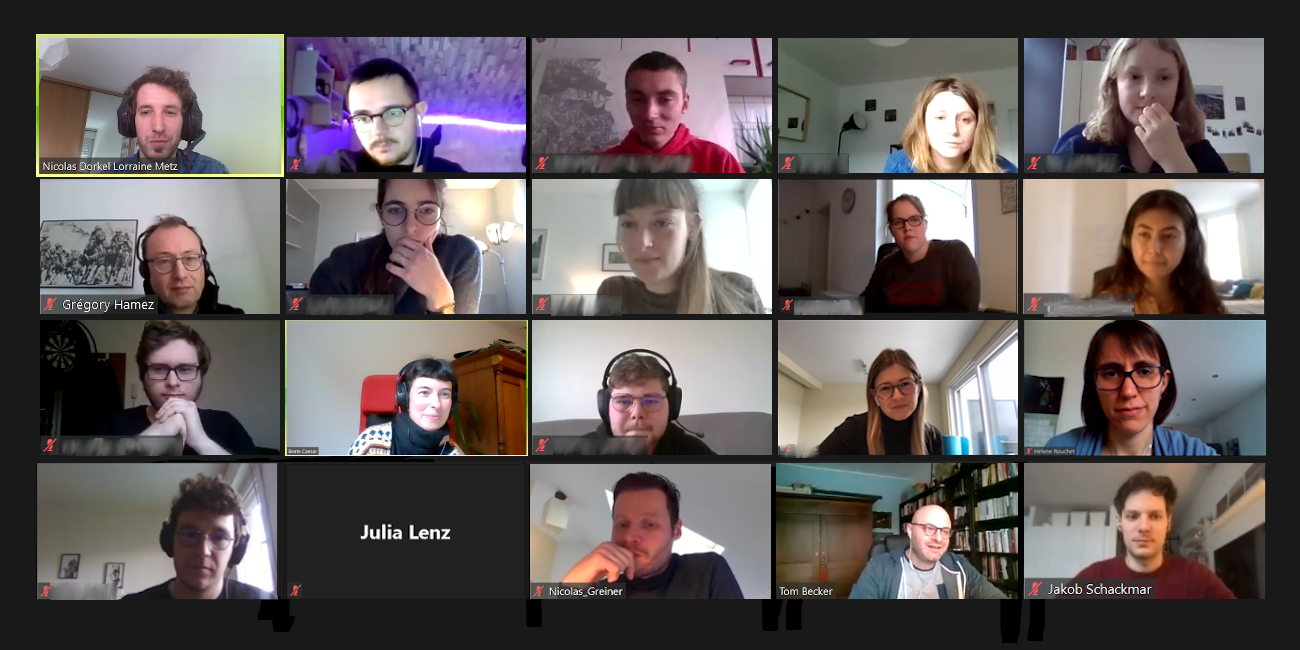
Due to the very positive feedback after the first cross-border student planspiel in June 2019, it was held a second time in January 2021. To this, it was first revised and updated as part of a seminar by students from the University of Lorraine. The focus was on cross-border learning to promote sustainable spatial development. It was organized and led by students and researchers from the University of Lorraine in Metz, with the support of researchers from the "Working Group Spatial Planning" of the UniGR-Center for Border Studies from the Universities of Liège, Luxembourg, Lorraine, Saarbrücken and Kaiserslautern. Thanks to the digital format, it could be carried out across borders despite the COVID-19 pandemic and brought together 12 students from the departments of Spatial and environmental planning at the University of Kaiserslautern, as well as Geography and spatial planning at the universities of Lorraine and Luxembourg. Thereby the students had the opportunity to practice cross-border cooperation using the innovative method of the planspiel.
Mixed international groups worked on various urban situations. It became clear that the characteristics of cities – be it a modern city, an industrial city, a medieval city or a city located in the mountains – can differ greatly and have an equally complex impact on the planning challenges and opportunities. That was agreed upon by the students. Together, they developed scenarios to meet spatial development policy requirements and objectives from various areas - economic, social, environmental, etc. - in a sustainable manner. In doing so, they drew knowledge from their different degree courses as well as examples from their own countries to clarify their ideas and exchange experiences. After short group rounds, they presented and discussed their ideas in plenary and received feedback from the other groups as well as researchers. In addition, discussion rounds with live surveys on the topics of participation in urban development and the effects of COVID-19 on spatial planning, as well as photo puzzles on the border region expanded the seminar.
The aim of the seminar was to initiate learning processes and to sensitize students to planning in cross-border areas, as well as to explore existing differences in the understanding of spatial planning and the underlying paradigms between countries and regions. As the seminar was held in English, the students' subject-related discussion, moderation and presentation techniques in English were promoted. In addition, the students were able to receive ECTS for the planspiel seminar at their home universities. The feedback from the students was consistently positive. They praised the cross-border digital character, which made it possible to get to know students from other countries in the current situation, which is strongly influenced by the national lockdowns, and to exchange professional ideas with them, get to know new perspectives and learn from each other. They also considered the teaching format to be particularly interactive, innovative and interesting and recommended offering the seminar again in the coming years so that other students can benefit from this exchange.
-
September 2019 | Planspiel ECO-REGIO GREATER REGION 2.0 with planners from the Greater Region
-
Organization: WG Spatial Planning Department, University of the Greater Region / UniGR-Center for Border Studies, Europäische Akademie Otzenhausen, Evangelische Akademie Bad Boll | Location: Europäische Akademie Otzenhausen, Nonnweiler | Date: 12 and 13/09/2019

Following a revision of the ECO-REGIO GREATER REGION planspiel, it was played out again with planners in the framework of a two-day seminar with the aim of ensuring that cross-border cooperation in the field of spatial planning is approached in an experimental way, with a view to mutual learning and reducing obstacles to cross-border spatial planning due to difficulties in understanding. The seminar provided an opportunity for dialogue between researchers and planners. The main questions to be answered during the planspiel were the following:
- What are the similarities in spatial planning?
- What aspects hinder or impede cross-border cooperation and spatial planning?
- In which areas is cross-border cooperation essential?
The results of this research serve as a basis for researchers to explore the importance of different planning cultures within the border area.
Overall, the planspiel was welcomed by the planners. The simulation was an opportunity to implement cross-border spatial planning in an operational way and to tackle national barriers, something that rarely if ever happens in this form. It appeared that the planners, despite the fictional nature of the workshops, were able to draw parallels with their real practices and chose similar methodological approaches.
Overall, the planspiel was welcomed by the planners. The simulation was an opportunity to implement cross-border spatial planning in an operational way and to tackle national barriers, something that rarely if ever happens in this form. It appeared that the planners, despite the fictional nature of the workshops, were able to draw parallels with their real practices and chose similar methodological approaches.
In the reflection phases that followed the workshop, the observed behaviour of the planners could be compared to actual planning practice. The planners were pleased to be able to meet planners from neighbouring countries during the seminar and to learn more about planning in other countries as well as in cross-border contexts. In addition, common ground in planning practice could be identified and misunderstandings/disagreements reduced, which is not possible in everyday practice due to the lack of opportunities to maintain intensive contact with colleagues from border regions. The researchers of the Working Group Spatial Planning are using the observations and results collected to draw conclusions about the planning cultures of the countries.
-
June 2019 | First cross-border planspiel "Cross-border spatial development and planning cultures" with students from Metz (University of Lorraine) and Kaiserslautern (TUK)
-
Organization: Technical University of Kaiserslautern & Université de Lorraine: Students of the Master and Bachelor 2019 study projects of the department "Internationale Planungssysteme" specialising in Spatial and Environmental Planning, TUK I supervisors: Beate Caesar, Jakob Schackmar (RPTU), Grégory Hamez, Nicolas Dorkel (ULor) and Working Group Spatial Planning | Location: Kaiserslautern | Date: 20 and 21/06/2019
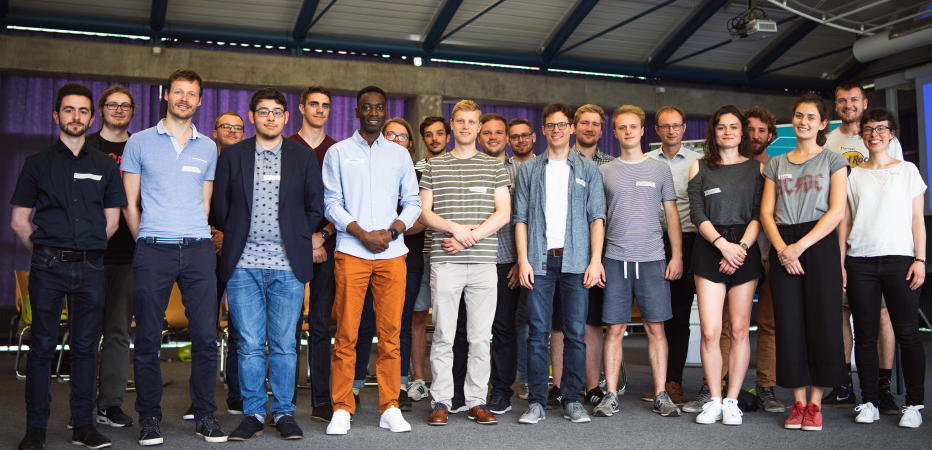
Within the framework of two study projects, students from the Department of Spatial and Environmental Planning developed their own English-language planspiel for space science students of the Greater Region during the summer semester 2019 under the supervision of the Spatial Planning Working Group. On the one hand, the objective was to enable students from the universities of the Greater Region to engage in cross-border exchanges and to develop and promote cross-border projects in the field of competition and cooperation. In doing so, they were able to learn from each other, question their own planning methods, develop intercultural skills and take up challenges in the coordination of cross-border planning. In addition, the students' subject-related discussion, moderation and presentation techniques in English were promoted. On the other hand, the TUK student organizers were able to gain an insight into the different approaches and priorities of the actors as well as the different cultural approaches to planning. The results resulted in a project report. The workshop encouraged cooperation and exchange in teaching between the partner universities, which is to be continued, and will be repeated in April 2020 due to the very positive feedback.
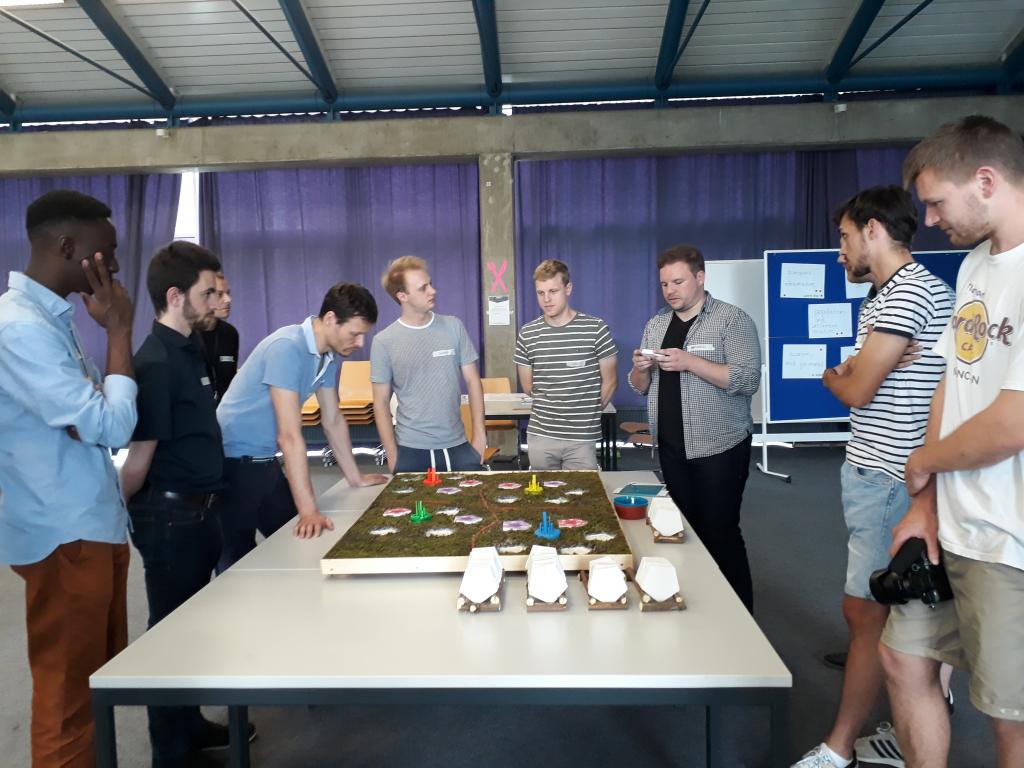
-
July 2017 | Experimental edition of the planspiel ECO-REGIO GREATER REGION 1.0 with students from the Technical University of Kaiserslautern, Masters' seminar
-
Organization: Technical University of Kaiserslautern (TUK): Beate Caesar, Lena Albert | Location: Kaiserslautern | Date: 27/06/17
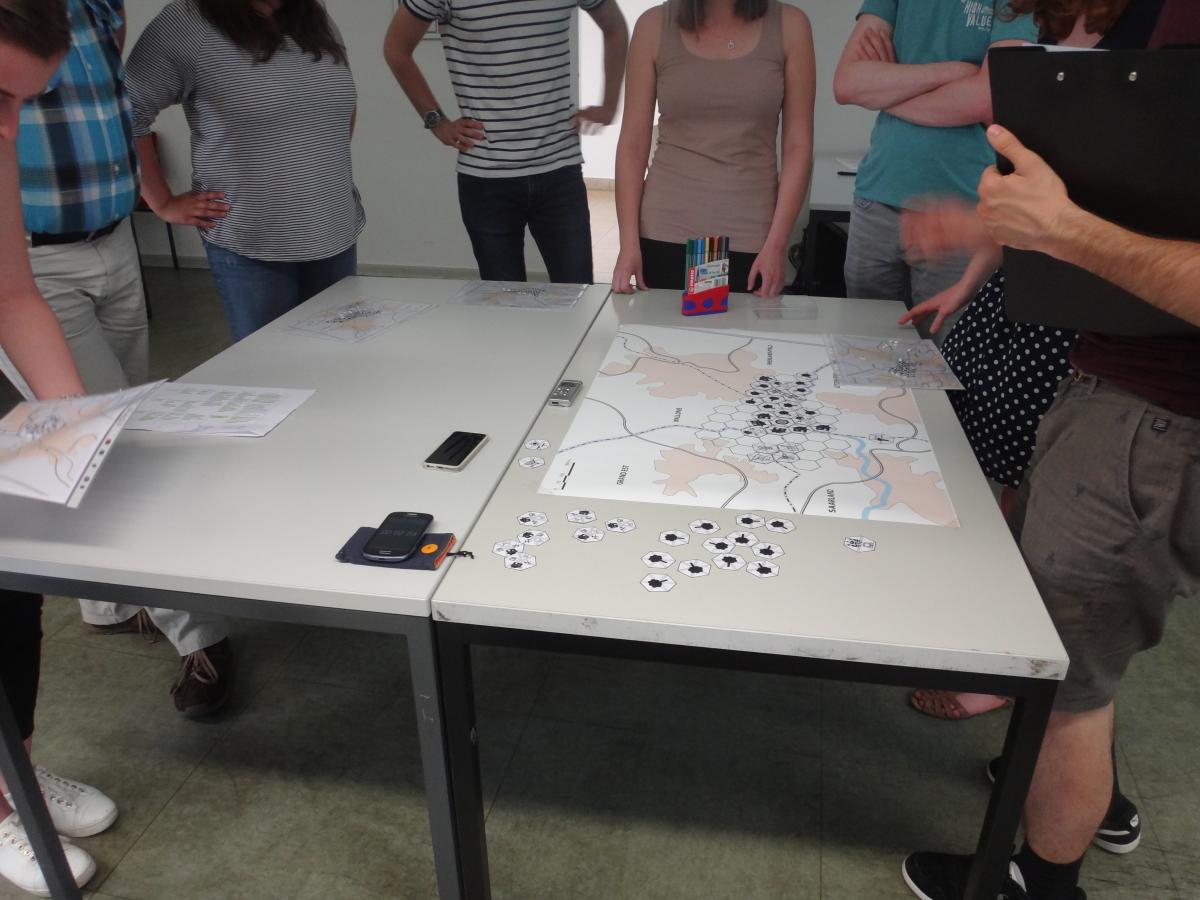
After the first edition of the planspiel ECO-REGIO GREATER REGION with the participation of planners of the Greater Region in May 2017, a second edition with 15 students from the Spatial and Environmental Planning departments took place in June 2017. The simulation was integrated into the seminar “Cross-border cooperation”, proposed by the department “Internationale Planungssysteme (IPS)” (international planning systems), and was carried out in a shortened form. As the time dedicated to the actual implementation was only 1h 30 min, the students had to familiarize themselves with the distributed material before the planspiel was carried out. The French-language information material was translated into German in advance, as the group was made up of German students and a student from Luxembourg.
The purpose of the workshops was to familiarise the students with the different axes and objectives of the planning documents for the slopes of the Greater Region - Rhineland-Palatinate, Saarland and especially Luxembourg, Wallonia and French region Lorraine or the Grand Est - and to enable them to slip into the role of planners in the different countries. Their task was to implement the objectives of the partner regions in the best possible way and to develop a common concept for ECO-REGIO in discussion with the other partner regions. This gave them an initial insight into the different planning cultures of the partner regions and enabled them to experience the challenges of coordinating cross-border spatial planning.
-
May 2017 | Planspiel ECO-REGIO GREATER REGION 1.0 with planners during the workshop "Borders and planning cultures".
-
Organization: WG Spatial Planning, University of the Greater Region / UniGR-Center for Border Studies | Location: Maison de la Grande Region, Esch-sur-Alzette | Date: 18 and 19/05/2017
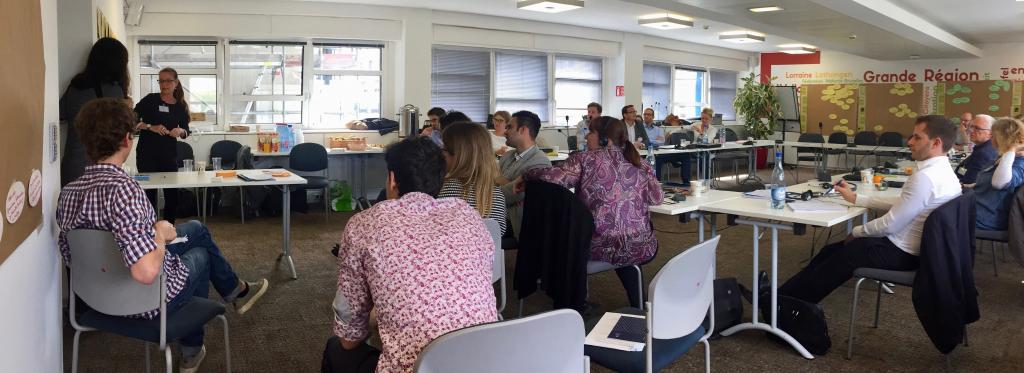
Each geographical entity of the Greater Region has its own models, traditions and regulations on spatial planning, i.e. different “planning cultures”. Working, studying, shopping and participating in cultural events are just a few of the cross-border activities. They reflect both the dynamics of the Greater Region and the issues at stake for planners. How can cross-border spatial development be effectively managed to meet future social, economic and environmental challenges?
At the initiative of the members of the UniGR-CBS “Spatial Planning” working group, around thirty researchers and planners from the border region met on 18 and 19 May 2017 at the Maison de la Grande Région to provide some answers to this question. They then took part in a planspiel that aimed to jointly develop a planning concept for a cross-border eco-region. The scientific method of the planspiel enabled the researchers to filter planning practices and cultures. The numerous empirical results of the two half-day workshops will be evaluated by the researchers, jointly published in academic journals and used in their respective research projects. The numerous approaches of this workshop have been integrated in a “Policy Paper” designed for decision-makers in the Greater Region.
The working group would like to thank the partner institutions (ASKO Europa-Stiftung; Institut de géographie et d'aménagement du territoire, Université du Luxembourg; Maison des Sciences de l'Homme, Université de Lorraine; Haus der Großregion; UniGR-Center for Border Studies) that facilitated this workshop.
“... The playful discovery of the different planning systems was entertaining and very informative.”
“... I realised that cross-border spatial planning is characterised not only by institutional and legal barriers, but also by considerable deficits in coordination and communication. Overcoming these disparities would therefore require a better understanding of different planning cultures.”
“... a shared exchange of views on the strategies of the actors in the implementation of a development project.”
“...an experience to be relived without a doubt!”
-
Would you like to participate in planspielen in other contexts?
-
The working group Spatial Planning is currently managed by the RPTU. The main contact person is Beate Caesar (beate.caesar@ru.rptu.de).

